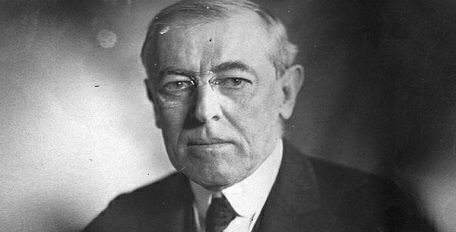The name of former United States and Princeton University president Woodrow Wilson may soon be erased from that college’s buildings and institutions, after a student protest. Here’s a look at what the nation’s pundits, from all sides, are saying about the controversy.
 The debate over Wilson’s legacy involved a 32-hour student sit-in this week, which ended with an agreement between students and school officials to reappraise Wilson’s presence at the Ivy League institution.
The debate over Wilson’s legacy involved a 32-hour student sit-in this week, which ended with an agreement between students and school officials to reappraise Wilson’s presence at the Ivy League institution.
Princeton president Christopher L. Eisgruber said in a statement the school will consider removing a Wilson mural and Wilson’s names from buildings and programs.
Wilson served as president of Princeton University from 1902 to 1910 before becoming U.S. President in 1913. His legacy in the White House was mixed; known as a Progressive, Wilson (who grew up in the South), also was a public supporter of racial segregation.
Here is a round-up of recent editorials, in alphabetical order by author, that present differing viewpoints.
Also, our weekly We The People podcast talks about these broader issues in connection with free speech and hate speech on campus. You can download the full podcast at the following link: /news-debate/podcasts/the-first-amendment-speech-debate-on-college-campuses
Randy Barnett, Georgetown University Law Center, and Director of the Georgetown Center for the Constitution
Barnett tackled this issue back in June 2015, saying, “No doubt there are others whose names should also be expunged. But because of his record of official racism and betrayal, Wilson’s name should be first on any such list. Those who oppose its removal from government buildings should explain exactly why whatever principle of tolerance they apply to so extreme a purveyor of racist policies as Wilson should not be applied equally to memorials to other historical figures as well.”
John Fund, National Review
“Progressive activists began their historical purge last year by getting several state Democratic parties to end their traditional “Jefferson-Jackson Day” dinners on the grounds that Thomas Jefferson and Andrew Jackson were racists. Not satisfied, they are now turning on Wilson, and who knows whether FDR, who didn’t allow his black and white White House servants to eat together, is next.”
David Harsanyi, The Federalist
“Although I suspect there will be pushback to this contention: Wilson also oversaw one of the greatest foreign-policy disasters in American history, World War I. The untenable outcome was bad enough, but the massive social engineering project Wilson helped spearhead is still being paid for. Simultaneously, Wilson sent American citizens to jail for expressing opinions that cast the government or the war effort in poor light. There are many insane things happening on college campuses these days, but calling out Woodrow Wilson is not one of them.”
Link: http://thefederalist.com/2015/11/19/princeton-students-are-right-woodrow-wilson-was-the-worst/
Los Angeles Times Editorial Board
“We can see why African American — and other — students object to honoring historical figures who held noxious views about race. Yet the sad reality is that the United States has a long history of racism and many of its founders were slaveholders. There is no easy answer to the question of whether or when the names of racist historical figures should be removed from buildings or monuments. In some situations, an attempt to eliminate offense can amount to rewriting history. Better in those cases to acknowledge the history and learn from it. In other cases, the names should go.”
Link: http://www.latimes.com/opinion/editorials/la-ed-college-master-20151120-story.html
Dylan Matthews, Vox
“Wilson's racism wasn't the matter of a few unfortunate remarks here or there. It was a core part of his political identity, as indicated both by his anti-black policies as president and by his writings before taking office. It is completely accurate to describe him as a racist and white supremacist and condemn him accordingly.”
Link: http://www.vox.com/policy-and-politics/2015/11/20/9766896/woodrow-wilson-racist
Esther Maddox, Princeton Black Justice League
“We cannot passively recognize Woodrow Wilson, Class of 1879, and other individuals’ problematic legacies and change the school’s name. We, as an institution of higher learning, must think critically about our role in history and how it has shaped the present. By not recognizing the importance of this discourse, the University is telling its marginalized community and the outside world that it values its bleached-clean version of history over the prolonged discomfort and alienation of students of color. This erasure is especially dangerous in the present context of state-sanctioned violence against Black people that prolongs this genocide.
Link: http://dailyprincetonian.com/opinion/2015/10/back-to-back-on-woodrow-wilson-class-of-1879/
Zeena Mubarak, Princeton Student
“It is true that it is wrong to deify historical figures. Thus, acknowledging Wilson’s racism is important. We cannot allow him to be portrayed as the infallible patron saint of Princeton when his words are hurtful to so many current Princetonians. However, wiping out his name and face would do nothing to spur on dialogue or to change racist institutions. It would only allow us to try to forget that we have inherited a legacy that was created by people whose personal views we do not agree with.”
Link: http://dailyprincetonian.com/opinion/2015/11/we-must-not-erase-woodrow-wilson/
Alexandra Petri, Washington Post
“I would make a plug for keeping the thing but putting it in context. Put an asterisk next to the monument. Put a note at the entrance to the hall. Put a plaque next to the statue explaining exactly who and what this is. The more context, the better … History is full of things we would rather forget. But removing them is not the way to go. Besides, if you take the name off every building and institution named for a historical figure who was Wilson-level lousy, we’d have few institutions left.”
Link: https://www.washingtonpost.com/blogs/compost/wp/2015/11/19/losing-woodrow-wilson/







